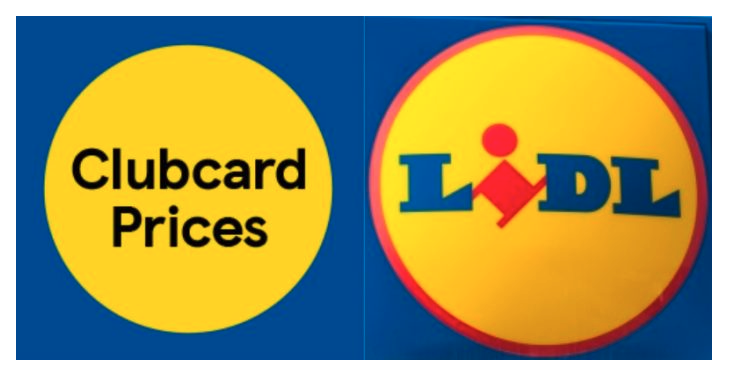Details of the case
In June 2021, Lidl, the German international discount retailer, sued British retailer Tesco, alleging that a sign used for Tesco's clubcard scheme constitutes a trademark infringement of Lidl's trademarks. Lidl owns two UK trademarks that it claims Tesco's clubcard sign infringes. One is a wordless mark consisting of a yellow circle with a red border in a blue square. The other trademark consists of the same features but with the Lidl logo in the middle of the circle.

Tesco has argued that the purpose of Lidl's registration of the wordless trademark in 1995 was to use the trademark as a "legal weapon" to prevent competitors from entering the market, which would constitute the registration to have been made in bad faith. If the application for a trademark is considered to have been filed in bad faith, it can be invalidated, wholly or partially. A declaration of invalidity removes the registration from the register with retroactive effect. The court dismissed Tesco's case on bad faith in June, but the Court of Appeal in London ruled that the argument should be part of a trial of Lidl's initial lawsuit and Tesco's counterclaim, which is due to be heard at the High Court early next year.
Bad faith in trademark law
Trademark is a sign capable of distinguishing one company's goods or services from those of other companies. The use of a trademark is closely related to branding efforts pursued by an organisation, resulting in differentiation, recognition and customer loyalty. At the same time, the trademark offers a considerable level of legal protection against infringement attempts.
Brands can lose or oppose somebody else’s trademark on the grounds of bad faith filing. Bad faith typically arises when a business is pursuing a filing strategy that is, in some sense, cheating the system. The EUIPO outlines different types of factors or behaviours that may constitute bad faith:
The concept of bad faith is broader than deliberate registrations of third-party signs for identical or similar goods; the lack of commercial logic underlying the application may itself suffice to establish bad faith.
Bad faith exists where trademarks are filed with no intention to use, but only if at the time of application there existed a dishonest intention of undermining the interests of third parties or an intention to obtain exclusive rights for purposes falling outside the functions of the trademark.
A repeat filing made to avoid the consequences entailed by non-use of earlier trademarks may constitute a relevant factor which is capable of establishing bad faith on the part of the person who filed that trademark.
Lindt & Sprüngli AG vs Franz Hauswirth GmbH
One of the very first cases where the CJEU laid down the principles of the bad faith trademark applications was Chocoladefabriken Lindt & Sprüngli AG vs Franz Hauswirth GmbH of 2009. The dispute concerned Lindt’s registration in the year 2000 of the three-dimensional trademark representing a chocolate bunny wrapped in gold foil wearing a red ribbon with a gold bell around its neck. After the registration of the said trademark, Lindt proceeded to take legal action against manufacturers, amongst which Hauswirth, producer of similar products with similar presentation to that of the chocolate bunny, protected by said trademark. Hauswirth claimed that the primary scope behind Lindt’s registration of the three-dimensional trademark was to eliminate competitors from the market in which they had been operating for a number of years and hence made in bad faith.
The Court upheld the claim that registration made on the basis of an intention to prevent a competitor from manufacturing a product may be considered filing made in bad faith, particularly when the applicant has no real intention to make use of the trademark itself. When applying such considerations to this specific case, the Court ruled that there was strong evidence of bad faith on the part of Lindt at the moment of registration, as a consequence of which Lindt’s registration was revoked.
Pest Control vs Full Colour Black
A similar decision was reached in the case over a trademark ‘Laugh Now’ owned by Banksy. In 2019, the greeting card company Full Colour Black formally opposed the trademark, claiming that it was filed in “bad faith”. In 2021, EUIPO upheld the claim stating that, at the time of filing, Banksy had no intention of making genuine use of the trademark and that his true intention, similar to Hasbro, was to circumvent the legal requirement of proving genuine use. At the end of October 2022, however, the EUIPO's Fifth Board of Appeal overturned this decision, proclaiming in R1246/2021-5 that after further review, the arguments and evidence provided by Full Colour Black did not support any evidence of “dishonest behaviour” on the part of Bansky. It concluded that “consequently, the presumption of good faith is still valid, and the cancellation applicant failed to prove the contrary.”
These cases show that courts still vary greatly with the interpretation of “bad faith” filings. Determining whether a trademark has been filed in bad faith requires a thorough examination of the facts and circumstances of the case and significant evidence of perceptions of the general public in regard to the trademark. In the EU, the General Court is yet to further clarify when brand owners will be considered to be acting in bad faith by seeking trademark protection for a broad range of goods and services or by pursuing repeated filing.


